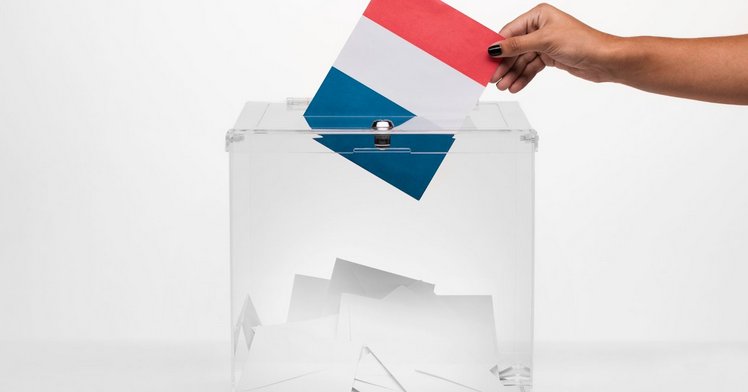French President Emmanuel Macron will face off Marine Le Pen in the second round of one of the most consequential elections in French history on Sunday, April 24.
If elected again, Emmanuel Macron will go on to be the first president to be re-elected to office in 20 years. After the conclusion of the first round of voting Macron led the voting charts with 27.8% of the votes, with Marine Le Pen in second place with 23.1% of the votes - a déjà vu of 2017 French presidential elections. The potential elections of the two candidates, at the opposite sides of the political spectrum and ideology, would mean diverging routes for how relations between France and the European Union will be shaped in the future.
In terms of reshaping relations with the EU, Macron is an ardent Europhile and has called for greater cooperation and partnership with the Bloc in sectors of energy, defence and agriculture. In the wake of Angela Merkel’s exit from active politics, Macron is often seen at the forefront and is one of the most visible leaders of the Bloc. His sharp reaction to the Russian invasion of Ukraine, and vocalisation of the EU’s urge to move ahead with sanctions, helped in raising his approval ratings and gave him the potential chance for his re-election again.
While seeking to envisage a more enhanced role of the EU in shaping policies for the member states, Macron, on the other hand has been wary about partners outside the bloc, calling for a protectionist stance and involving thorough scrutinization of the takeover of key EU strategic companies by outsiders. He has also called for greater regulations on US tech companies, especially when it comes to data privacy policies and pushed for European companies to have a greater say in the digital space and governance of the bloc. In the domains of security, Macron, although initially sceptical about the role of NATO, in the current scenario, there is firm belief within him (even though it may just appear just for the public eye and not actually a personal conviction), about the essence of the organisation, especially in this ongoing war. He also seeks less dependence, for both his country and the Bloc, on the USA for defence assistance. Mindful of Chinese influence in the Indo-Pacific and other regions, it is yet to be seen if Macron calls for an independent policy of the EU to tackle Chinese influence, or pursues a collaborative approach with US, UK and Australia, especially in the wake of a major submarine deal dispute among them.
On the other hand, his competitor, Marine Le Pen is running the race on a very different platform. Often referred to as “Madame Trump’’ for stances similar to that of the former U.S. President Donald Trump, her potential takeover of the Elysée Palace could severely impact ties with the EU and France’s relations with other member states. She has promised to drastically cut sales and income tax for many young French workers, and raise the minimum wage by 10%. She is very likely to defy the EU’s core rules, by giving French citizens preference for jobs, housing, and welfare benefits, imposing border controls around France, drastically cutting immigration, and blocking Muslim practices like wearing headscarves in public and traditional Halal meat slaughtering.
In terms of strategic defence partnership, Le Pen is sceptical of the role of NATO, and might very likely pull out of the alliance, if garnered enough support for it. Most drastically, she sees a partner in Russia and regaining relations with Vladimir Putin in a post war period. Le Pen’s campaign slogan, “give the French back their country and their money,” echoing chants of nationalism, has found space with working- and middle-class people in the countryside who have felt abandoned by the lack of protection due to globalisation and the EU’s ever-expanding workforce entering the French market. Le Pen’s tenure is likely to be marked by new grown tensions between the EU and France, and deviating France from the basic core values which has shaped the relations between the two partners for so long.
Domestically, Le Pen has campaigned around issues of rising prices and inflation and the need for revitalising the middle-class with job prospects through her “French First” policy and her hard line on immigration and ousting the non-French workers from the market. Macron, on his part, sought to focus his campaign on Le Pen’s far-right views on immigration, her stance on the hijab, and her alleged ties to Russian banks. He rebuked her plans to ban Muslim women in France from wearing headscarves in public, that would trigger “civil war” in the country that has the largest Muslim population in Western Europe. Macron’s handling of the yellow vest protests, as well as the pandemic, has also been a major factor in shaping the elections.
The French presidential election results would be a major turning point as to how the relations between France and the EU are shaped in the years to come. Experts have given the nod to Emmanuel Macron, to once again lead the French masses for another 5 years. If that is to happen, he will have to deal with a series of challenges: tackling domestic inflation and price rise, drawing a ceasefire to the war in Europe, shaping policies and frameworks for the better positioning of the French Republic, and anchoring the role of an enhanced EU in today’s highly volatile global environment.

Follow the comments: |
|
